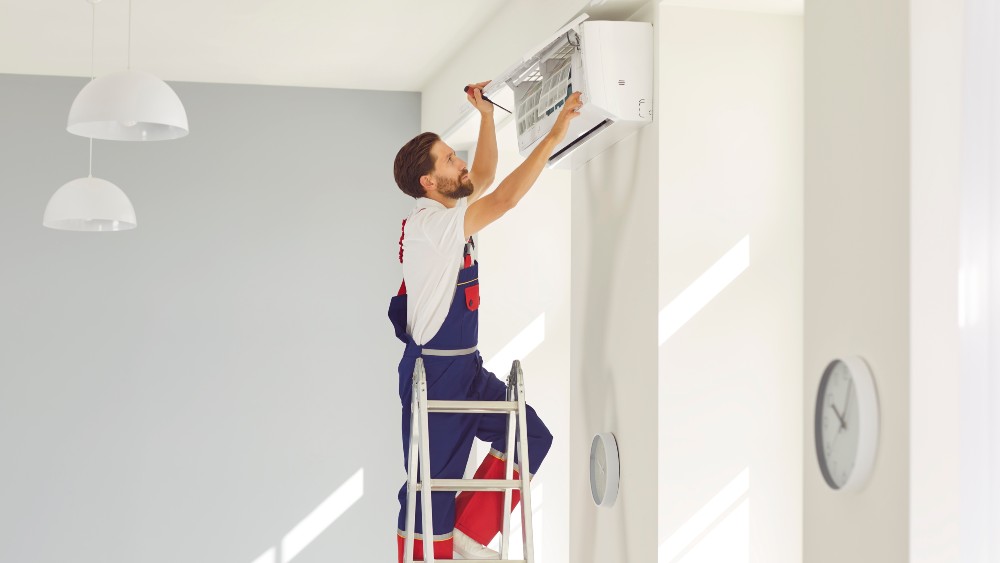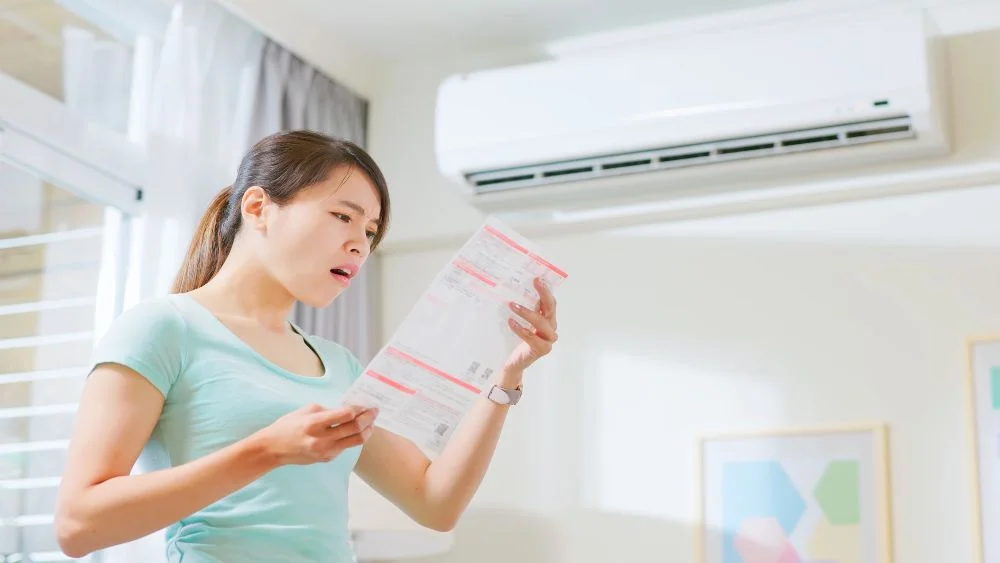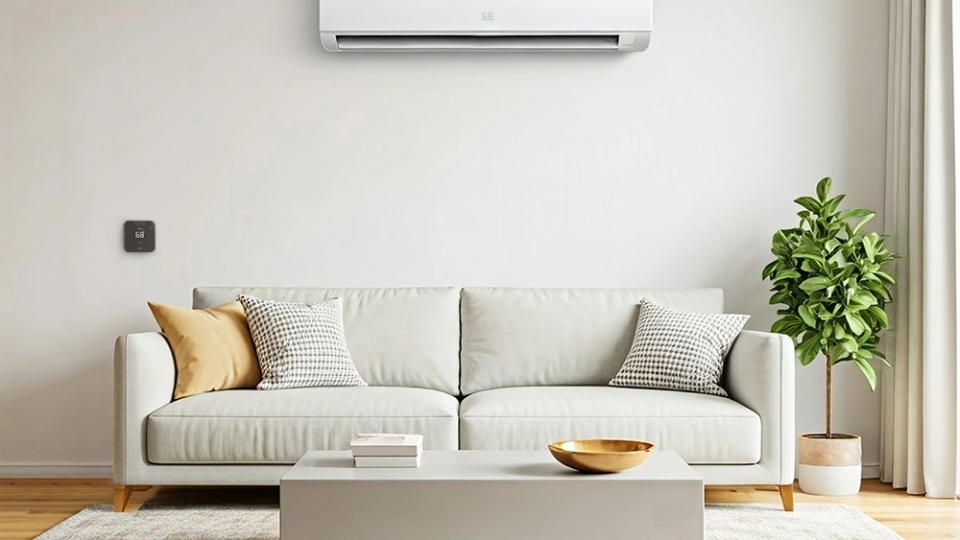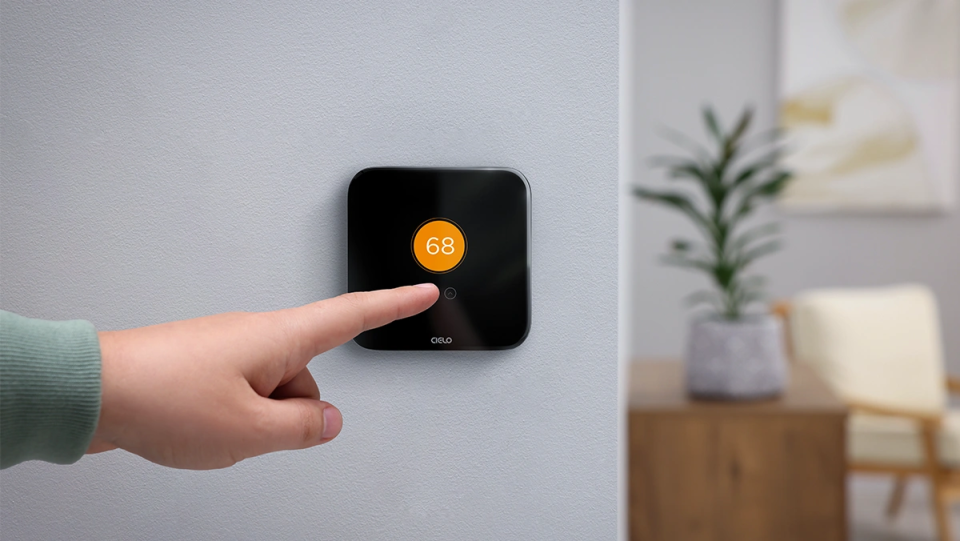
- An aging AC unit, often struggles to maintain desired temperature, causing it to work harder.
- If your AC requires repairs every now and then, it’s an indicator that replacement may be more cost-effective.
- A new AC system delivers enhanced performance, increases overall comfort, and helps reduce energy bills.
Air conditioners play a crucial role in maintaining comfort, especially during sweltering summer months. Like any other home appliance, they endure wear and tear over time, eventually requiring repairs or replacement.
If you’ve noticed your AC struggling to work effectively or experiencing frequent breakdowns, it may be time to evaluate the condition of your unit.
This AC replacement guide will discuss the signs that indicate whether your air conditioning system needs repairs or should be replaced entirely. It will explore factors such as age, efficiency, cost, and environmental impact to help you make a decision that maximizes comfort and saves you money.
Telltale Signs Your AC Needs Replacement
As your AC unit ages, its performance may decline, leading to increased energy bills and reduced cooling capacity.
-
Frequent Breakdowns and Costly Repairs
If you need repairs at least once every two months, it’s often a clear indicator that it’s time for AC replacement.
As air conditioners age, repairs can become more expensive. Even if individual repair costs aren’t exorbitant, frequent expenditures add up over time.
-
Your AC Unit Has Become Inefficient

If you maintain regular HVAC upkeep and annual tune-ups, but your AC is still failing to achieve the desired temperature, it may be time to consider replacing the unit. As air conditioners get older, their efficiency tends to decline, making it harder for them to maintain desired cooling levels. Another common issue with malfunctioning air conditioners is inconsistent cooling, which results in uneven temperature distribution and may also be an indicator of your unit malfunctioning.
Related: Air Balancing: 16 Ways You Can Fix Hot & Cold Spots And Maintain Even Temperature
-
Aging AC Unit
An air conditioner’s lifespan is typically 10-15 years. As an AC system ages, it may require more frequent repairs. If you call for repairs multiple times a year, especially as the system approaches or exceeds its average lifespan, it’s a sign that it’s time to replace it.
Here’s how you can extend the life of your AC unit.
-
Increased Energy Bills

Inefficiencies in your AC system that result in inadequate cooling can cause it to work harder and longer to maintain a comfortable temperature. This increased workload can lead to higher energy bills.
This is when AC replacement can help. Newer AC systems are designed with energy-efficient technologies and better performance, meaning they use less electricity to cool your home effectively.
-
Environmental Effects and Availability of Refrigerant
R-22 refrigerant is used in many air conditioners that are older than ten years. This AC refrigerant is no longer permitted to be produced in the United States as of 2020. As a result, any leftover supplies are far more expensive than the easily accessible R-410A refrigerant found in contemporary systems. This will not only increase the cost and difficulty of refrigerant repairs, but the product may also add to the ozone layer’s thinning in our environment. So, it’s best to opt for replacement in case older ACs require refrigerant recharge.
-
Mismatched AC System
Indoor and outdoor air conditioning units should work together to heat and cool your house properly. A mismatched system is more prone to malfunction.
It’s worth updating one or both units so they can function together if your mismatched system is the source of your ongoing problems.
-
Your AC Poses Safety Risks
If your air conditioning unit emits carbon monoxide or poses a fire hazard, replacing it becomes imperative. Prioritizing safety is crucial to protecting your household from potential risks. Also, the now-banned refrigerant in older AC units harms the ozone layer. Replacing these units helps reduce this potential threat.
Top Signs Your AC Needs Repair
Here are the scenarios and conditions under which repairing your AC makes perfect sense.
-
AC Unit Leaking Refrigerant
If your AC is turning on and off frequently or struggling to achieve your desired temperature, a refrigerant leak could be the reason. You might see pooling water or ice on the refrigerant lines.
Contact an HVAC technician to repair the leak and recharge your system.
-
AC Is Blowing Warm Air

If you notice warm air coming from your AC, it doesn’t necessarily mean you need to replace your system right away. There are various possible reasons and solutions for this issue. It could be due to a malfunctioning thermostat that isn’t accurately communicating the set temperature to your AC unit. Another potential cause could be problems with the compressor or restricted airflow. These issues can often be addressed without needing to replace the entire air conditioning unit.
-
AC Not Turning On
If your AC isn’t turning on, it might be repairable, depending on the cause. Common issues include a tripped circuit breaker, a blown fuse, thermostat problems, or a malfunctioning capacitor. An HVAC professional can often fix these. However, if the problem lies in a major component like the compressor or if the system is outdated, replacement might be necessary.
Related: Air Conditioner Circuit Breaker Keeps Tripping? 10 Possible Causes & How to Prevent Them
-
Unusual Noises Coming From the AC
Typically, an air conditioner should operate quietly. If you hear loud buzzing, rattling, or other unusual AC noises, call an HVAC repair technician. These sounds often indicate a loose, damaged, or dirty part. Replacing or cleaning the part should resolve the noise.
-
Insufficient Airflow
If there’s inadequate airflow from your AC vents, investigate a few things before thinking about replacement. Check that your air ducts aren’t blocked or clogged. If that’s not the issue, have an HVAC professional inspect the motor and blower to ensure they are functioning correctly.
-
Your Ductwork is in Poor Condition
Many homeowners assume that they need to replace their AC unit when it starts having trouble cooling or heating their home. However, in many cases, the AC unit is fine; it’s the ductwork that is to blame. When conditioned air leaks out of the ducts, the AC unit works harder to cool or heat the home, leading to higher energy bills and decreased efficiency. Simply repairing the ductwork can solve the problem and restore the AC unit to its proper function.
Know When to Repair or Replace Your Air Conditioner
Choosing between replacing or repairing your air conditioning system can be challenging. However, considering a few critical factors can significantly aid in your decision-making process.
| Repair | Factors | Replace |
| Less than 15 years | Age of the Unit | More than 15 years |
| Small parts | Extent of Damage | Large, expensive parts like compressor |
| Less than half the unit’s total value | Cost of Repairs | More than half the unit’s total value |
| Repairs are required once in a while | Frequency of Repairs | Repairs are required every 2 months |
| Energy consumption hasn’t increased | Efficiency | Bills have increased significantly without explanation |
| Your preferred temperature is achieved | Comfort Level | Doesn’t maintain your desired temperature. You experience hot and cold spots |
| If you are relocating shortly | Intent to Stay at Your Home | If you do not plan on shifting |
| The manufacturer will fix or replace parts if you have a valid warranty | Warranty Considerations | Frequent repairs and expired warranty |
-
Assess the Extent of Damage
If a small part needs to be repaired, and your unit is relatively young, repairing it makes sense. However, if the repair is of a major component, such as replacing a compressor, replacing it may be more economical in the long run.
-
Apply the 5000 Rule
Typically, air conditioning repair experts tend to recommend repairing a unit instead of opting for replacement when the repair costs are less than half the unit’s total value. Another approach some technicians follow is the 5000 rule. According to this method, you multiply the equipment’s age by the repair cost, and if the resulting number is greater than $5000, it often makes more financial sense to consider a replacement.
-
Your Aesthetic Preferences
If you’re renovating your home, you might find that an old, worn-out air conditioner doesn’t fit the new aesthetic you’re going for, even if it functions well. Modern AC models have sleek, contemporary designs that blend seamlessly with the modern home décor.
-
Intent to Stay in Your Current Home
If you intend to relocate within the next few years, replacing your older AC unit might not be a smart investment, especially if there hasn’t been a catastrophic failure or the repairs are too expensive. But remember that if the AC unit is outdated or not well maintained, and you are looking to sell your house, a buyer can ask for a lower asking price.
-
Replacement Incentive Programs
Although it is an expenditure, changing your AC unit may be worthwhile due to a number of benefits. If you upgrade to a more modern and energy-efficient model, for instance, you may be eligible for a federal tax credit. Additionally, you should look into any state or local rebates that may be able to lower the overall cost of replacing your old air conditioning equipment.
-
Your Comfort Preference
Your comfort level is a crucial consideration when determining whether to replace or repair your current AC unit. Is your unit taking a lot of time to cool down your home despite repeated repairs? Or is your AC too small for your home and needs to work twice as hard to keep up with your demands? If your comfort is your priority, it’s better to opt for an AC replacement.
Related: The Ideal Room Temperature for Every Situation & 7 Ways to Maintain It!
-
AC Warranty Considerations
Over time, AC components can wear out or break. Purchasing an AC warranty can protect you from unexpected repair costs, as it guarantees the manufacturer will fix or replace parts during the warranty period. However, if a major replacement is required, and your warranty has expired or is invalid, consider getting a new unit.
Related: Does a Home Warranty Cover Your HVAC Repair & Replacement?
Cost Analysis: AC Replacement vs. AC Repairs

When faced with the decision of repairing or replacing your air conditioning unit, a detailed cost analysis can help determine the most cost-effective and practical choice. Here’s a comparison of the two options:
AC Replacement Cost
On average, replacing a central air conditioning system in a typical home can range from $3,905 to $7,990. Factors influencing the cost include the new unit’s efficiency rating, local labor rates, and whether any rebates or incentives are available. It’s essential to get quotes from reputable HVAC contractors and consider long-term energy savings when evaluating replacement costs.
AC Repairs Cost
The cost of repairing an air conditioner can vary significantly depending on the specific components needing attention. Minor repairs, such as replacing smaller parts, might cost a few hundred dollars or less. However, larger components like the AC compressor or evaporator coil can be much more expensive, ranging from hundreds to several thousand dollars.
You can get a fair idea of how much you would need to spend on the repair of these AC components:
| AC Repair Type | Average Cost Range |
| Fan motor | $100-$700 |
| Compressor | $800-$2800 |
| AC leaking water | $200-$1600 |
| Circuit board | $200-$600 |
| Evaporator coil | $600-$2000 |
| Refrigerant recharge | $200-$500 |
In Conclusion
The decision to replace your AC should be based on a combination of factors, including age, efficiency, repair costs, and comfort needs. If your system is old, inefficient, and constantly needing repairs, the benefits of a replacement outweigh the initial investment. Plus, you’ll enjoy the peace of mind that comes with a reliable, modern AC system. So, if your AC has seen better days, it might be time to consider an upgrade for a cooler, more comfortable home.








